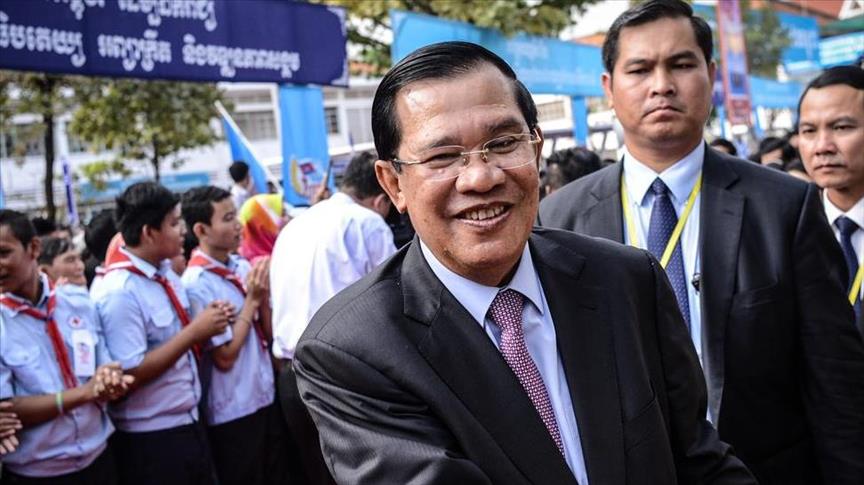PM’s medical trip raises doubts over Cambodia health care
Opposition figure tells Anadolu Agency health system in state of ‘dysfunction’ where wealthy travel abroad while others seek treatment from pharmacies without investigation

Phnum Penh
By Lauren Crothers
PHNOM PENH, Cambodia
The Cambodian prime minister's medical trip to Singapore on a private jet this week proved the perfect opportunity to post photos of himself on Facebook -- along with reassurance that he still maintains good faith in Cambodia’s health system.
But some were not so convinced by Hun Sen's endorsement, and if the behavior of public and elite figures is anything to go by, the country's health facilities leave a lot to be desired.
For years Cambodian leaders have sought medical help elsewhere. King Norodom Sihamoni routinely flies to Beijing for medical check-ups, as did his late father Norodom Sihanouk, who was on a similar trip when he died of a heart attack in 2012.
Late Cambodian People’s Party president Chea Sim also used to travel overseas -- in his case, to Vietnam -- for health checks before his death last year.
On Monday, prior to his overseas check-up, the premier pre-empted any backlash, including a disclaimer saying it “does not mean that I do not trust doctors [in Cambodia].”
“I do a monthly, quarterly, annual health check and treatment in Cambodia by Cambodian doctors,” he elaborated.
Hun Sen claimed he had been advised to travel to Singapore to receive some tests with equipment that Cambodian hospitals lack, and that he was accompanied by local doctors “to cooperate with the medical examination of common medical collaboration”.
The Cambodian Health Ministry received $271 million of the $4.27-billion budget for 2016, an 8.6-percent increase from the previous year but still far short of the $669 million plunged into defense and maintaining security.
The country's public health system is made up of large, national hospitals, provincial health centers, referral hospitals and smaller health posts.
In 2009, several of the larger state-owned hospitals transitioned into financially autonomous institutions, which health officials said would improve the quality of care available to Cambodia's poorest.
However, a year later, at least one study on Calmette Hospital in Phnom Penh found that poor patients were not receiving the same standard of care compared to those paying for treatment, according to The Cambodia Daily.
At the Kantha Bopha children’s hospitals, which were founded in 1991 by Swiss physician Dr. Beat Richner, 756,006 sick children received outpatient treatment last year, while 137,270 children had to be hospitalized.
Lengthy queues form every morning outside one of its Phnom Penh sites, indicating just how many people rely on the free treatment provided within.
In an email to Anadolu Agency on Wednesday, opposition party spokesperson Yim Sovann claimed that Cambodia's health system is in a state of “dysfunction,” where “most people seek treatment from pharmacies without investigation, some from private clinics [or] from neighboring countries.”
In addition, the trend that sees wealthy people travel abroad for treatment shows that they are “not confident” in the system, the Cambodia National Rescue Party member said.
He underlined that these problems have been compounded by a lack of state insurance and insufficient efforts to educate the public on how they can prevent certain diseases.
Add to that the prevalence of counterfeit medications, and -- according to Sovann -- physical and mental illnesses “will increase poverty” in the absence of a functional health system.
At a legislative level, he said that what needs to be done is to tackle the manufacture and sale of counterfeit medicines, as well as creating “an effective health-care policy for the poor and poorest.”
He added that the $271-million health budget amounted to just $18 per capita.
“What can we do with this money?” he asked. “Increase the health care budget, the state budget for the education of medical teams, budget for treatment, not just pay small salary to the medical team, budget on clinical studies and research.”
On Tuesday, the Phnom Penh Post reported on a row that erupted earlier this month when a United States doctor, Quach Mengly, gave an interview to the paper alleging that “unqualified and unethical medics are the ones who kill people.”
The report also quoted from a response issued by the Committee of Cambodian Medical Professionals, which defended efforts made by the government to improve the sector.
On the day that Hun Sen posted the photos of his journey to Singapore, political analyst and Future Forum think-tank founder Ou Virak posted on Facebook that Cambodia’s health system was a “mess” and its minister, Dr. Mam Bunheng, “should be replaced.”
Speaking to Anadolu Agency, Virak said one of the system’s key weaknesses is “a complete lack of accountability” and quality control.
He pointed to the devastating outbreak of HIV that rocked a small community in Battambang province at the end of 2014, caused by a rogue, unlicensed medic who used the same syringes on hundreds of people.
In the wake of the outbreak, the government vowed to crack down on unlicensed clinics and medics — though for the more than 200 people in the affected commune, such action came too late.
Virak said the buck ultimately stops with Hun Sen — that there is no need to deny that he is going to get more credible treatment in Singapore — but that he needs to address inherent issues at home first.
“He’s the prime minister and he has to acknowledge and put forward reforms,” Virak said.
“Mam Bunheng isn’t good enough. We need someone energetic. Hun Sen has been going abroad while people have been dying every year.”
Several attempts by Anadolu Agency to reach Health Ministry spokesperson Ly Sovann were unsuccessful.
Hun Sen, meanwhile, returned to Cambodia on Thursday, announcing on Facebook that the Singaporean medical team had deemed him “healthy and strong”.
Anadolu Agency website contains only a portion of the news stories offered to subscribers in the AA News Broadcasting System (HAS), and in summarized form. Please contact us for subscription options.

